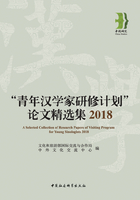
Chinese Cultural Diplomacy in Germany
Bilateral cooperation is expressed by the increased status and recognition the German government attributed to Sino-German relations. One of the most important mechanisms are the bilateral consultations,in place since 2011 when German Chancellor Angela Merkel welcomed Chinese Premier Wen Jiabao to the first German-Chinese intergovernmental consultations in Berlin(Auswärtiges Amt,2016). In 2014,the Sino-German relations were upgraded from a “strategic partnership in global responsibility” to a“comprehensive strategic partnership”.
The multitude of cooperation mechanisms focus mainly on technology,economic and educational cooperation,as expressed in the official statement of bilateral intergovernmental consultations or e.g. in key documents such as the China Strategy of the German Federal Research Ministry(BMF). The German Foreign Office has thus stepped up efforts and personal on China,aiming to aim for a more structured Asian policy and an increase in China related knowledge and skills(Auswärtiges Amt,2017 ).
Cultural cooperation between China and Germany dates back to the late seventies. In 1978,a delegation from the German Federal Ministry of Research and Technology visited Beijing. This started discussions on an intergovernmental agreement on cooperation in science and technology(Wan Gang,2016). In October 1978,both governments signed the “Agreement between the Government of the Federal Republic of Germany and the Government of the People’s Republic of China on Scientific and Technological Cooperation”,one of the first cooperation agreements between both countries. The agreement on economic cooperation and the agreement on cultural cooperation came into force within the two following years. Since then,cooperation in the field of culture has been stepped up significantly. The first meeting of the Sino-German High-Level People-to-People Dialogue to promote and support social and cultural exchange was held in Beijing on 24 May 2017.Attended by more than 500 people,the meeting was cochaired by Germany’s then Foreign Minister Sigmar Gabriel and China’s Vice-Premier Liu Yandong. The dialogue aims to improve the environment for civil society exchange between Germany and China in the areas of education,culture,language,media,sports and youth.
Cultural,Academic and Exchange Activities
●Promotion of Chinese language
Until today,there are nearly twenty Confucius Institutes in the country,most of them established at universities through cooperation agreements,with a budget of around 200,000 to 350,000 Euros annually(Thies,2015). Apart from the language focus,the institutes themselves show differences in their further non-language programme,including cultural competency courses with a corporate focus,SinoJobs Career Days,a special focus on secondary teacher training in Göttingen,a focus on exhibitions in Berlin,courses in calligraphy and cooking,Tai Chi classes,Green Economy in China and introductions to the Chinese legal system. What follows below is a list of Confucius Institutes across the Federal States:
Table1:Distribution of Confucius Institutes in Germany

In his study on Confucius Institutes in Germany,Hartig(2010,p.11)notes that the institutes maintain a degree of autonomy when it comes to teaching materials,combining the official Hanban materials with their own materials.In the case of Germany,a multi-dimensional structure on which the promotion of China and image-building can be,built and can be further assessed. A 2018 report by the Mercator Institute for China Studies assessed the needs of Germany engaging with China and emphasized the importance of strategically well-positioned country approach and skilled professionals with an into-depth China knowledge. The authors assess that the focus on China at university y level has universities has grown since the mid-1990s,including sinology and interdisciplinary courses focusing on China,additional offers and certificates,German-Chinese study programs and double degrees. As of November 2017,there were 1347 formal cooperation schemes between Chinese and German universities(Stepan,Frenzel,Ives & Hoffmann,2016,p.53).
The report also notes that while there are over 100 support programs that support China stays of varying duration,the increase of Chinese institutions as implementers for support programs targeting cultural and educational exchange,as for example the China Scholarship Council(CSC)awarding of grants to the Chinese Ministry of Education,which is awarded on behalf of the Chinese government for study and research stays targeting aiming at different target groups,including,students,graduate students,volunteers,scientists and young professionals. Thus,an increasing number of Chinese institutions are located directly in Germany,such as the Confucius Institutes or Chinese private companies,such as the German section of the technology giant Huawei,which has launched its own support programs for the German target group(Stepan et al,2016,p. 83).
This observation correlates with other studies on Chinese cultural diplomacy which notes the increasing role of private sector companies in representing and forging cultural and educational ties. At secondary level,about 5000 students are currently learning Chinese at German schools,with a decline in numbers throughout the last years. This is in a stark contrast to France in the immediate vicinity of Germany,where around 38,000 students are learning Chinese at secondary level(Stepan et al,2016,p.41). Overall,however,there have been efforts in stepping up Chinese studies and a clear professionalization of the field is noted(Stepan et al,2016,p.10). That said,the tertiary education level infrastructure to engage with China in terms may differ or even lack behind other major European countries,such as France and the UK,but nevertheless rests on a strong foundation.
●Promotion of art and traditional culture
Germany’s capital Berlin is host to a China Cultural Center,opened in 2008,as a counterpart of the Goethe-Institute in China. The multi-dimensional relations with China to Germany are further substantiated by cultural exchange continue,such as the “Deutschland 8” exhibition that opened in Beijing in September 2017.It follows the “China 8” exhibition that was staged in North Rhine-Westphalia in 2015.Further examples show the diversity of actors involved in promoting Chinese culture in Germany,as for example a 2018 exhibition in the German city of Düsseldorf held by the information office of the Qinghai provincial government on the culture,art and landscape of Qinghai Province showed(Xinhua News Agency,2018). Bigger scale events,such as the 2007-2010 event series “Deutschland und China-Gemeinsam in Bewegung” [Germany and China-Together in Motion],the 2012 “Chinesisches Kulturjahr” [Chinese Culture Year] in 2012,and the “Deutsch-Chinesisches Sprachenjahr”[German-China Language Year] and the 2016 “Deutsch-Chinesische Jahr für Schüler-und Jugendaustausch”[German-China Year for Student and Youth Exchange].